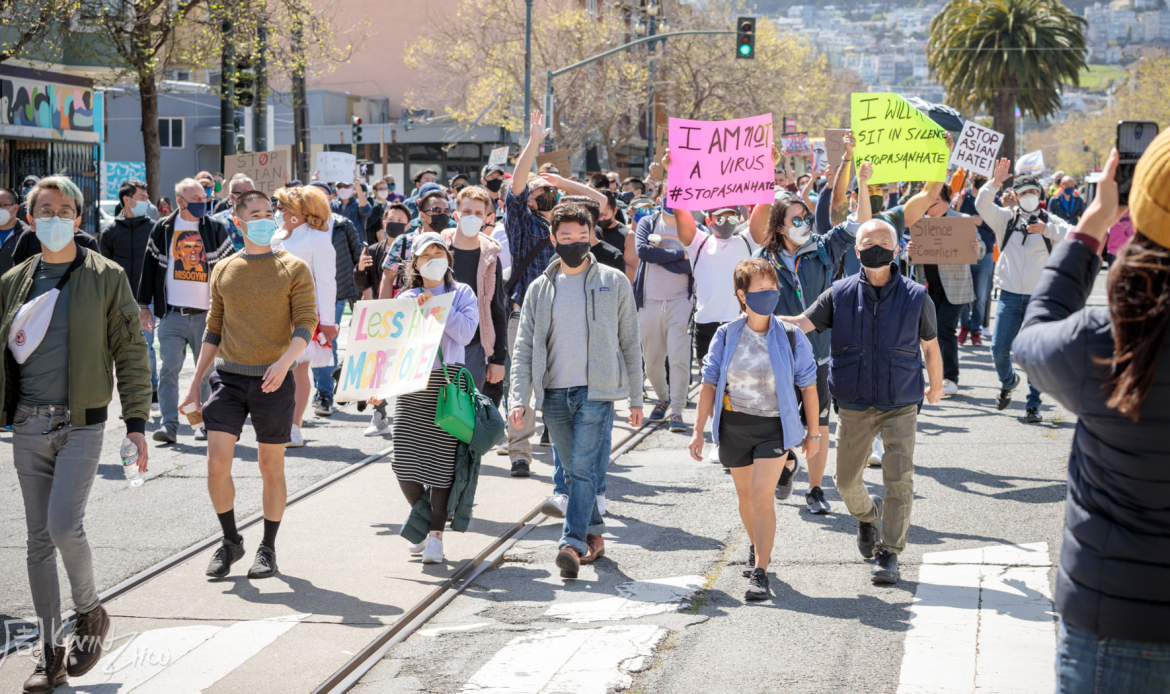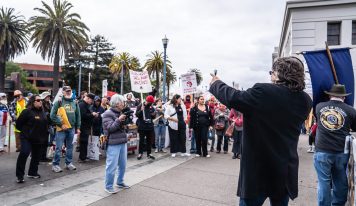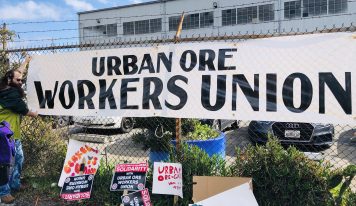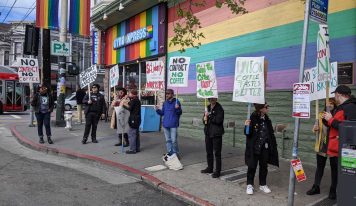SFIJ was excited to catch up with James Coleman, one of the recently elected members of South San Francisco’s city council. Coleman, a South San Francisco, native, has set several historic firsts for city council. At 21, he is the youngest person ever elected to the council, defeating 18-year incumbent and mayor Richard Garbarino with over 51 percent of the votes in the last election. He’s also the first self-identified LGBTQ+ individual and self-identified Democratic Socialist. He’s one of a small but growing number of Democratic Socialists elected in California and other levels of government nationwide.
Coleman cites his experience growing up in South San Francisco and political activism while a student at Harvard University as key motivations for his run for city council. His mother, a Taiwanese immigrant, was a lab tech at Kaiser Permanente. His father worked at FedEx until an accident left him disabled due to a spinal injury. He passed away 10 years after. “I wondered, as a young child, why my father could not heal when he got injured and why my mother had to work two jobs to make ends meet,” said Coleman. “I wanted to study biology to help people heal, but also study government to make government work for all of us since the government wasn’t helping my family.”
While studying both subjects in college, Coleman got involved with the Harvard College Students for Bernie Sanders in 2019 for the 2020 election. He had previously phone banked for Sanders in 2016, while in high school. For the 2020 election, Coleman helped organize phone banks, canvassed on campus, and went to New Hampshire every other weekend. After Bernie Sanders dropped out of the 2020 election, Coleman and his classmates transitioned the group to a Young DSA chapter.
“We had built this really progressive Democratic Socialist infrastructure that we could use for other projects, such as organizing for tenants’ rights or working to house the homeless population.”
One of the many projects the Harvard YDSA worked on was trying to bring a version of California’s Project Roomkey to Cambridge in Massachusetts (where Harvard University is located), to purchase unused hotel rooms for the unhoused during the pandemic.
As the reality of the pandemic set in last year, Harvard kicked students off campus. Coleman returned home to South San Francisco. “I was looking for a way to get involved in the community and I started attending city council and school board meetings,” he said.
Then on May 25 of last year, George Floyd was murdered in Minneapolis by a police officer. The story is tragically familiar to many, including Coleman. “South San San Francisco is no stranger to police violence. Derrick Gaines, a local teenager, was murdered by a South City officer [in 2012], who was fired but is now working for the San Francisco police department.”
Coleman began working with a new group, Change SSF. The grassroots organization is focused on defunding the South San Francisco Police Department (SSFPD) and working through the SSF City Council to redistribute the budget to projects like affordable housing and youth service improvements. “We went to the city council meetings last year, advocating for change, but were met with condescension and dismissiveness from the old city council. Here were young people, getting involved in local city politics for the first time in their lives. We decided it would be a good opportunity to launch a campaign for city council and get one of our own elected.”

Coleman was one of the Change SSF members who lived in District 4, one of the positions up for election in 2020. “We ran me on a grassroots campaign run by hundreds of volunteers, rejecting corporate, real estate, and private developer dollars. And we unseated the mayor.”
Coleman describes himself as the leftmost member of the South San Francisco city council. “South San Francisco is [one of the] biotech centers of the world. It’s a big business city, but the residents are very progressive,” he said. “I ran in arguably the most conservative district. If I can win in District 4, we can potentially have a majority of the city council, if not the entire council, composed of DSA-aligned candidates.”
As a city council member, Coleman is working on several initiatives related to his campaign platform. His website highlights issues such as COVID-19 rental and mortgage payment relief and programs to address climate change, improve public safety, encourage affordable housing, establish universal pre-K, invest in infrastructure, and combat all forms of hate and racism.
Here are his thoughts on some of the key issues in South San Francisco and the Bay Area today.
On Universal Pre-K: “South San Francisco is one of the few cities that is lucky to have its own municipal pre-k program. [The current program] costs $600 per month, which is the only option for many families since private options range from $1,500 to $3,000 per month – more than some families pay for rent. But the wait-list is 700 families long. That’s a waitlist of 5 years, so you have to sign your child up before they’re even born. We’re overdue to expand the childcare system. We’re following the example set by Portland DSA in Multnomah County, Oregon [who helped campaign to get a similar universal Pre-K measure on the ballot in Oregon]: tax the rich, the highest earners, and use that money to fund childcare.
On Affordable Housing: “I support affordable, multi-family housing. Housing is currently unaffordable, while more households are becoming multi-generational. By allowing multi-family households and buildings to be built, we’ll be creating a more affordable and diverse housing stock for residents. I also want to pursue mixed-income social housing modeled on that of Singapore or Vienna. It’s time we stop treating housing as a commodity and more as a human right.”
On Transit: “In South San Francisco, we need to expand bus services to connect the eastern and western portions of the city. It’s the same case for many cities in the Bay Area. We need to make sure busses are frequent and reliable. Additionally, I believe that we should be expanding our biking and pedestrian infrastructure.”
On Addressing Climate Change: “We have studied several reach codes, one of which is a requirement that any new building or structure must be all-electric powered. We should also be exploring all-electric retrofits for existing buildings, too, and transitioning away from gas stoves, gas heating, and gas water heating. If we adopt reach codes for appliances mandating electric heaters, we’ll be able to get off natural gas appliances by the early 2030s. Housing and public transit solutions are also important for addressing climate change. Supporting electric vehicles, more robust public transit, and bike-friendly options are part of the solution, too.”
On Defunding the Police: “Funds from our police department can be redirected to other areas that would benefit the community. We need more mental health resources and social workers. We need to make sure that there is an unarmed public safety body that our public can trust to help them. Residents of color don’t feel safe with the status quo and that needs to change.”
Now that you’ve read about his views on the issues, what else should you know about Coleman? He’s been reading a lot of Naomi Klein. “Currently, I’m reading ‘On Fire: The Burning Case for a Green New Deal.’ But anything from her is good.”
He’s inspired by other politicians, especially fellow-Zoomer Alex Lee, a DSA-endorsed candidate elected to the California Assembly (D-25), and Bernie Sanders. “Looking at [Bernie’s] life story, how he ran for office again and again. He kicked off his career standing up for working people.”
On his own future, Coleman said he’s undecided. “I’m a spontaneous person. I announced my run for office the day before the filing deadline. I’m currently looking for a job in either the sciences or climate organizing. In 4 years, I might be running for city council again, or another higher office. Or I might want to go to grad school. I’ll be thinking about that.”
Since Coleman is early in his career, we decided to ask him what advice he had for those who are more advanced in age.
“Listen to your young people,” he said. “Support the younger generation. They also need to have their voice heard. Their perspectives and life experiences are different and they need to be at the table as well.”
Header Photo Credit: Morgan McCarthy





